Key Takeaways
- Outcall massage brings the therapist to you, giving you control over setting and schedule.
- In‑office massage offers a dedicated treatment space with professional equipment.
- Safety, hygiene, and therapist credentials matter for both options.
- Pricing varies by travel distance, session length, and added amenities.
- Choosing the right format depends on convenience, privacy needs, and budget.
Direct Answer
If you value privacy and flexibility, outcall massage is the better fit. If you prefer a calm, purpose‑built environment with a full suite of tools, an in‑office (or spa) setting wins. We’ll break down the details so you can decide which suits your lifestyle.
Comprehensive Guide to Outcall vs. In‑Office Massage
Imagine you’ve just finished a long day at work. You could book a therapist to come to your flat, set the lights, play your playlist, and start the session. Or you could head to a nearby wellness centre where the room is pre‑heated, the table is heated, and the scent of essential oils is already in the air. Both approaches promise relief, but they differ in logistics, cost, and experience. This guide walks you through everything you need to know before you click ‘book.’
Definition and Context
When it comes to relaxation on your terms, Outcall Massage is a service where a licensed therapist travels to your chosen location-home, hotel, or office-and delivers a full‑body treatment. In‑Office Massage (sometimes called spa or clinic massage) takes place in a dedicated treatment room provided by the business. Both are legal and regulated in the UK, but they serve slightly different client needs.
Benefits of Outcall Massage
- Convenience: No commute, no parking headaches.
- Personalized environment: You control lighting, music, and temperature.
- Time efficiency: Sessions can start exactly when you need them.
- Privacy: Ideal for people who feel uneasy in public treatment rooms.
Clients in London often praise outcall services for turning a cramped flat into a mini‑spa. One client said, “I could relax on my sofa, and the therapist set up a table that felt just as professional as any clinic.”
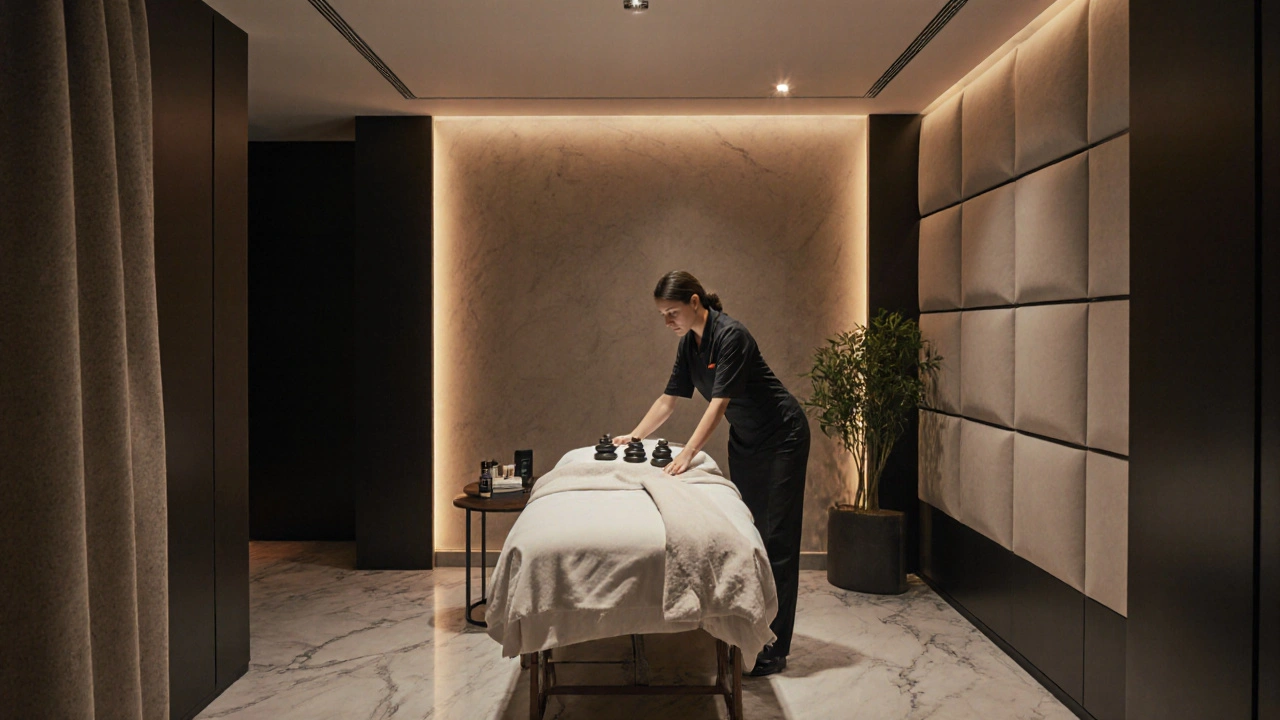
Benefits of In‑Office Massage
- Dedicated equipment: Heated tables, adjustable lighting, and top‑grade linens.
- Focused ambiance: The space is designed to eliminate distractions.
- Safety net: Staff on‑site can handle emergencies, and cleaning protocols are strictly monitored.
- Range of services: Many clinics bundle massage with aromatherapy, cupping, or reflexology.
For athletes recovering from intense training, the clinic’s specialized equipment often makes a noticeable difference in muscle recovery speed.
Types of Massage Services Available in London
London’s wellness scene offers a variety of formats beyond the simple outcall vs. in‑office split:
- Mobile (Outcall) Massage - therapist visits any address within a set radius.
- In‑Office / Spa Massage - treatment in a commercial space.
- Therapeutic Massage - focused on injury recovery, often offered in clinics.
- Tantric & Erotic Massage - intimate experiences, usually outcall for privacy.
- Nuru & Body‑to‑Body Massage - slippery, skin‑to‑skin style, commonly booked outcall.
How to Find Reliable Massage Services in London
- Check professional registries such as the UK Register of Massage Therapists (UKRMT) for verified credentials.
- Read recent client reviews on platforms like Google Business, Trustpilot, or dedicated wellness directories.
- Ask about the therapist’s insurance and vaccination status-especially important for outcall visits.
- Use reputable booking platforms that display therapist bios, rates, and available time slots.
Many Londoners start their search on neighbourhood‑specific Facebook groups, but a quick cross‑check with the therapist’s official website helps weed out scams.
What to Expect During a Session
Outcall Session
The therapist arrives with a portable table, clean linens, oils, and a small portable heater if needed. After a brief health questionnaire, they set up the space, adjust lighting, and begin the massage. You stay fully clothed unless you opt for draping that allows exposure of the treated area. The whole experience can feel like a private home spa.
In‑Office Session
You walk into a reception area, fill out a brief form, and wait a few minutes while the room is prepared. The therapist greets you, confirms any problem areas, and then leads you to a heated table with built‑in control panels for temperature. The environment is purpose‑built to minimize noise and maximize comfort.
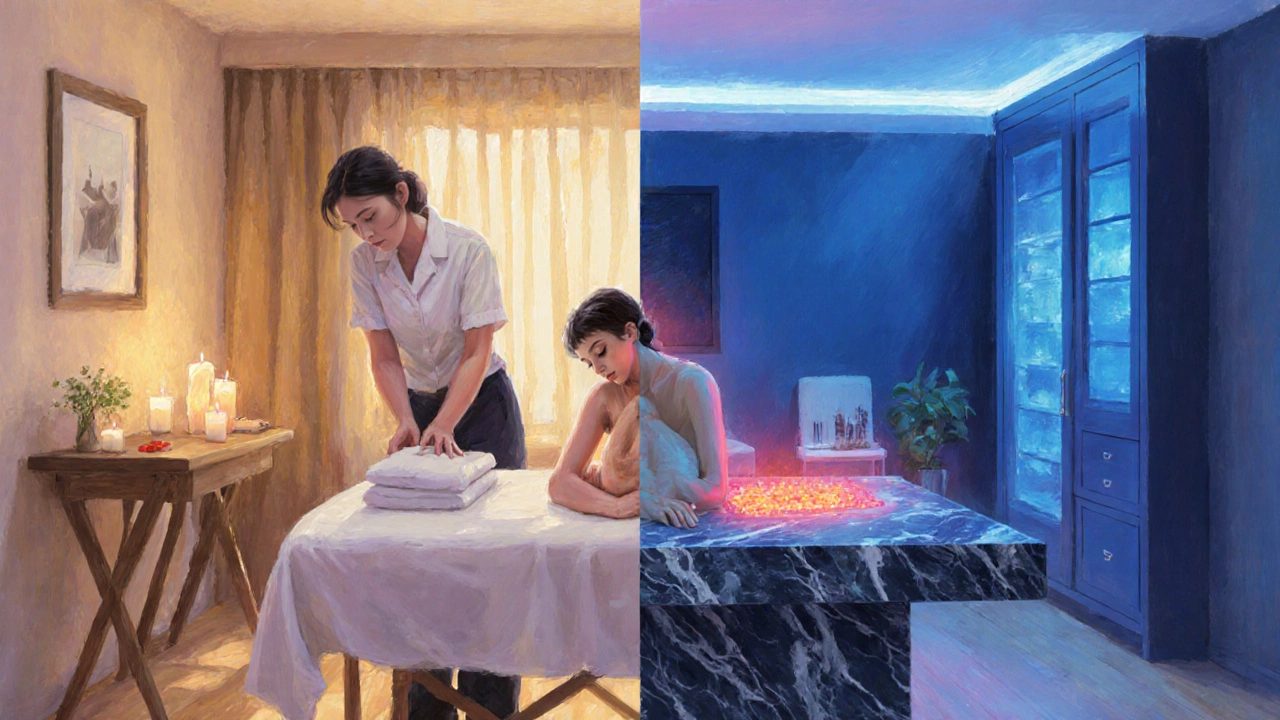
Pricing and Booking
London pricing typically falls into these ranges:
| Service | Typical Rate (per hour) | Travel Fee (if any) |
|---|---|---|
| Outcall Massage (city centre) | £85‑£110 | £0‑£15 (based on distance) |
| In‑Office Spa Massage | £90‑£130 | Included |
| Therapeutic Clinic Session | £100‑£150 | Included |
Most providers require a 24‑hour notice for cancellations. Booking can be done directly via their website, a phone call, or through a third‑party app that also handles payment securely.
Safety Tips for Both Formats
- Verify the therapist’s license and insurance before the first session.
- Ask about cleaning procedures for portable equipment-therapists should use disposable covers and sanitize surfaces between clients.
- Communicate any medical conditions, allergies, or recent injuries during the pre‑session questionnaire.
- For outcall visits, ensure someone you trust knows the appointment details and therapist’s identity.
- Trust your gut: if anything feels off, it’s okay to cancel or ask for a different therapist.
Comparison Table: Outcall Massage vs. In‑Office Massage in London
| Aspect | Outcall Massage | In‑Office Massage |
|---|---|---|
| Location Control | You choose the setting (home, hotel, office). | Therapist’s dedicated treatment room. |
| Equipment | Portable table, limited accessories. | Heated table, adjustable lighting, sound system. |
| Travel Cost | May add £0‑£20 depending on distance. | No travel fee. |
| Privacy | High - you’re in a personal space. | Moderate - shared facility but private rooms. |
| Scheduling Flexibility | Often available evenings/weekends. | Usually business hours; some offer extended slots. |
| Hygiene Assurance | Depends on therapist’s protocols; ask for disposable covers. | Clinic‑wide cleaning standards, documented logs. |
FAQ: Your Questions About Outcall and In‑Office Massage Answered
Is an outcall therapist certified the same way as a spa therapist?
Yes. In the UK, both must hold a valid UKRMT (or equivalent) qualification and carry professional liability insurance. Always ask to see their credential ID.
Will the therapist bring their own equipment?
For outcall services they bring a portable massage table, linens, oils, and any specialty tools. In‑office locations provide all equipment on‑site.
How safe is it to have a stranger in my home?
Safety comes down to verification. Confirm the therapist’s license, read reviews, and ensure they follow a clear COVID‑19/flu protocol (hand sanitising, mask if requested). Let a friend know the appointment details.
Can I request a specific massage style for outcall?
Most outcall therapists are versatile - Swedish, deep tissue, sports, or even tantric. State your preference when you book; they’ll confirm if they’re equipped to deliver it.
Do I need to tip the therapist?
Tipping isn’t mandatory in the UK, but a 10‑15% tip is appreciated for exceptional service, especially for outcall where travel time is involved.
Next Steps
Now that you understand the pros, cons, and practicalities, pick the format that matches your schedule and comfort level. Browse a trusted therapist directory, confirm their credentials, and book a trial session. Whether you stay in your living room or step into a boutique spa, the right choice will leave you feeling refreshed and ready for whatever comes next.
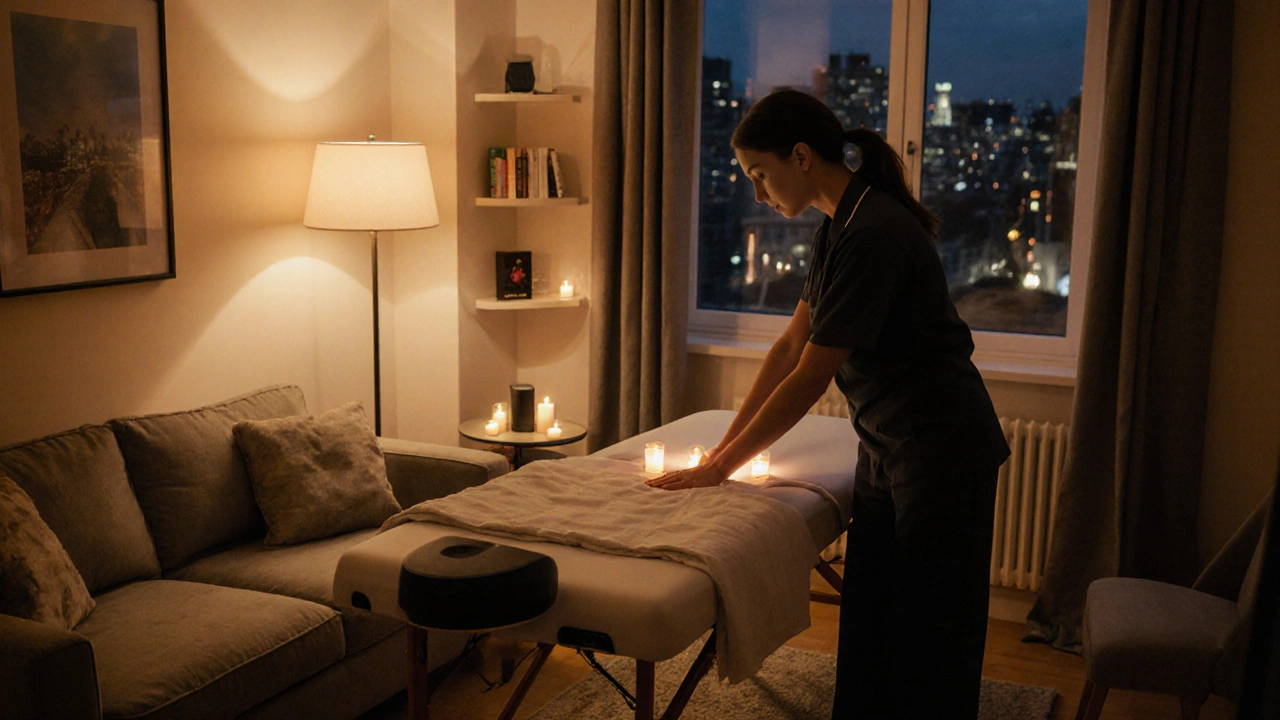


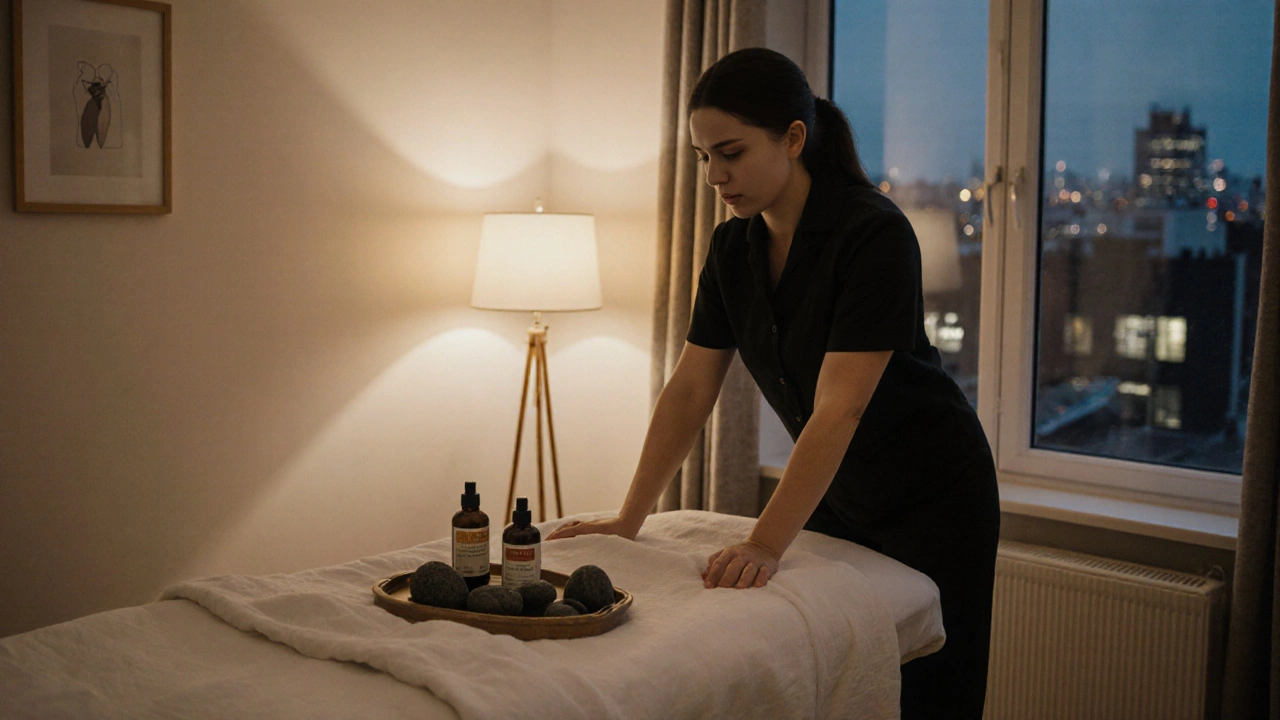
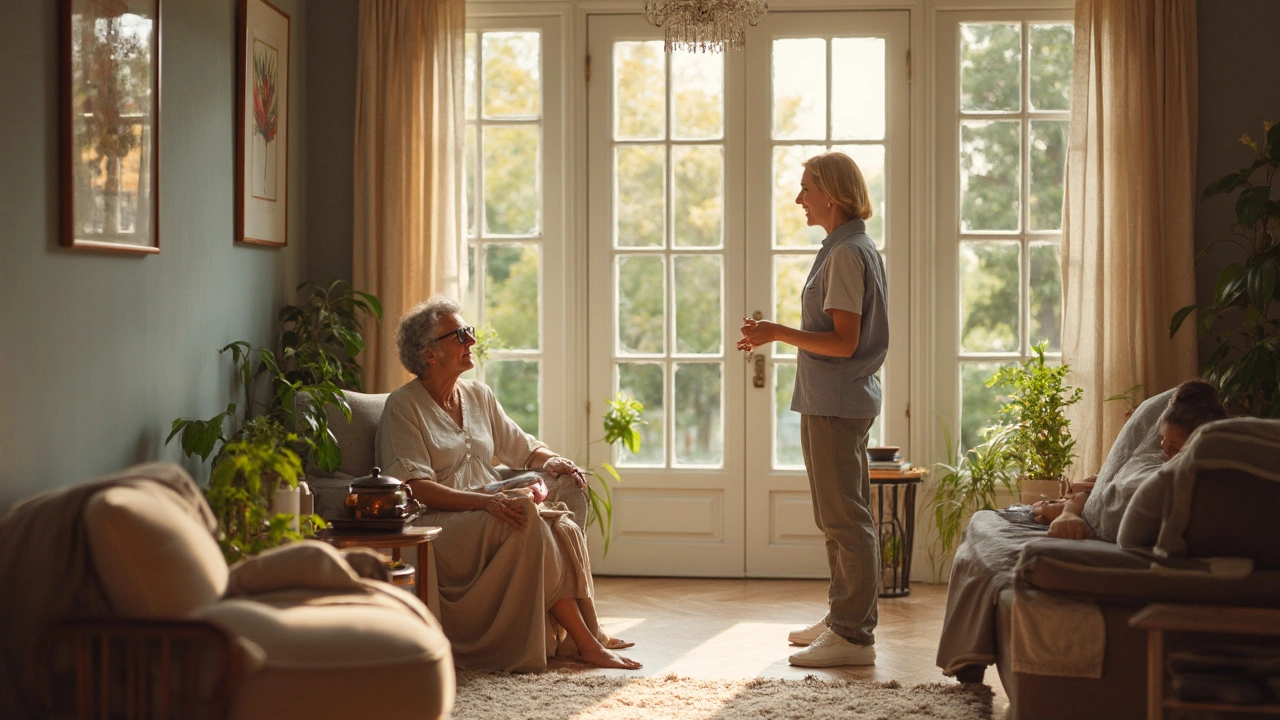
Peter Jones
October 13, 2025 AT 16:14When evaluating outcall versus in‑office massage, the primary considerations are convenience, equipment, and hygiene standards. Outcall services grant the client control over lighting, music, and scheduling, which can be particularly valuable for those with irregular work hours. In‑office clinics, however, typically provide heated tables, adjustable lighting, and a broader range of ancillary therapies such as cupping or reflexology. Both modalities require a therapist with a valid UKRMT credential and appropriate liability insurance. Ultimately, the decision should align with the individual's privacy preferences, budget, and desired therapeutic outcomes.
Theophilus Twaambo
October 22, 2025 AT 22:27While the previous overview appears comprehensive, it neglects several critical nuances; for instance, the assertion that “both modalities require a therapist with a valid UKRMT credential” disregards the fact that many outcall practitioners operate under alternative certifications-an omission that could mislead prospective clients. Moreover, the claim of “control over lighting, music, and scheduling” is overly simplistic; it fails to acknowledge the logistical constraints imposed by travel time, traffic conditions, and the therapist’s own availability. The contrast drawn between portable equipment and “heated tables” also ignores the variance in portable heating solutions that many outcall therapists now employ. Consequently, readers should seek verification of each therapist’s specific qualifications and equipment capabilities before making a commitment.
Douglas McCarroll
November 1, 2025 AT 03:40From a therapeutic perspective, the decision matrix can be framed in terms of load‑bearing variables: client autonomy, physiological stimulus fidelity, and risk mitigation. Outcall environments excel at delivering psycho‑emotional comfort, which can potentiate the parasympathetic response during a Swedish or deep‑tissue protocol. Conversely, an in‑office setting maximizes biomechanical precision through calibrated table ergonomics, allowing for optimal myofascial release and targeted trigger‑point modulation. If you’re an athlete seeking accelerated recovery, the supplemental modalities-such as infrared heat or proprioceptive neuromuscular facilitation-available in clinic‑based facilities may provide a measurable performance edge. Ultimately, aligning the chosen modality with your specific recovery objectives will yield the most efficacious outcome.
Andrew Cheng
November 10, 2025 AT 09:54That’s a solid breakdown-thanks for highlighting the technical side! 😊 It really helps to see how the equipment differences translate into actual recovery benefits, especially for folks who train hard.
Jillian Angus
November 19, 2025 AT 16:07Everyone’s talking about credentials and equipment, but nobody mentions the hidden agenda behind the “professional standards” they tout. The industry consortiums are funded by large wellness corporations that profit from keeping clients locked into expensive in‑office packages. Meanwhile, outcall therapists operate on the fringe, offering “alternative” approaches that could actually expose clients to unregulated practices-yet they’re painted as the rebellious heroes of freedom. It’s a classic diversion: tout the safety of a sterile clinic while the real risk lies in the data they collect from each session, feeding into predictive health algorithms you never agreed to. Stay vigilant; the choice isn’t just about comfort, it’s about who controls your body narrative.
Jennie Magalona
November 28, 2025 AT 22:20Choosing between outcall and in‑office massage invites a broader reflection on where we locate our sense of sanctuary in an increasingly mobile world. The home, once a private refuge, has been repurposed into a multifunctional space where work, leisure, and now wellness intersect, blurring the boundaries that once defined restorative environments. When a therapist steps into that domestic sphere, they bring not only skillful hands but also an implicit invitation to trust the familiar surroundings, a gesture that honors personal autonomy. In contrast, the sanctified walls of a spa or clinic are deliberately engineered to suspend everyday concerns, employing ambient lighting, curated scents, and calibrated temperatures to induce a collective state of calm. This curated ambience can be likened to a philosopher’s laboratory, a controlled setting where variables are minimized to focus solely on the phenomenology of touch.
Yet, both contexts rely on the same foundational principle: the human body’s innate capacity for self‑regulation when guided appropriately. The decision therefore becomes less about the physical location and more about the narrative one wishes to construct around self‑care. Does one prefer the narrative of reclaimed domestic sovereignty, transforming a living room into a personal oasis? Or does one find solace in the external narrative of a communal sanctuary, where the act of leaving home reinforces a psychological separation from stress? Moreover, the economic implications embed themselves within these narratives, as travel fees and premium clinic rates reflect differing valuations of time and expertise.
Culturally, the choice also signals an alignment with contemporary attitudes toward health-whether one embraces a decentralized, individualized approach or adheres to institutionalized models of wellness. In an era where technology mediates many aspects of health, the tactile, analog experience of massage stands as a counterpoint, reminding us of the embodied nature of healing. Ultimately, the “right” option emerges from a synthesis of practical considerations-schedule flexibility, budget, and safety protocols-and the deeper, often unconscious, story we tell ourselves about where healing should occur. By interrogating both the logistical and existential dimensions of this choice, we arrive at a decision that resonates with both our bodies and our lived philosophies.
Aashish Kshattriya
December 8, 2025 AT 04:34The whole thing is a surveillance trick.
leslie levin
December 17, 2025 AT 10:47Whoa, that’s a wild take! 😂 But honestly, I think the vibe of the space matters more than any hidden camera-just pick what makes you feel relaxed.